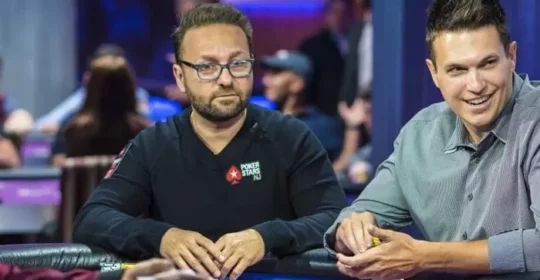When it comes to casino games, understanding odds is crucial for long-term success. Both Blackjack and Poker offer different challenges and rewards in this regard, but getting to grips with the statistical intricacies can make all the difference.
Table of contents
- Understanding the odds in Blackjack
- Poker odds: Skill takes centre stage
- Strategies for each game
- Speed of play and payouts
- Variability and risk
- House edge vs. Rake
- Which game is right for you?
- Understanding the importance of bankroll management
- Psychological aspects: Blackjack vs. Poker
- Variations of the games
- Social interaction: A hidden factor
- Conclusion
Understanding the odds in Blackjack
In Blackjack, the house edge is generally around 0.5% if you utilise a basic strategy. This set of guidelines dictates the best course of action for each potential hand.
By adhering to basic strategy, you can effectively increase your odds of winning over the long run. Counting cards, a technique not well-received by casinos, can further reduce the house edge and sometimes even tilt it in the player's favour.

However, this practice frequently results in the player being asked to leave the casino or being banned altogether.
Poker odds: Skill takes centre stage
Poker stands apart from Blackjack in that it is a game of skill, strategy, and psychology rather than simply a game of chance.
Unlike Blackjack, where you play against the dealer, in Poker you are up against other players.
The house takes a percentage of the pot, known as the rake. Your odds of winning at Poker depend mainly on your skill level, the skills of your opponents, and your position at the table.

Certain starting hands, like pocket aces in Texas Hold'em, give you an 80% or better chance to win against a single opponent holding random cards.
Strategies for each game
Blackjack strategies revolve around knowing when to hit, stand, split, and double down. Memorising a basic strategy chart can prove highly beneficial.
Counting cards, whilst frowned upon, can be an effective approach for proficient players. In Poker, strategies are often complex and develop over years of playing.
The art of bluffing, understanding pot odds, and reading your opponents are crucial skills that can tilt the odds in your favour.
Speed of play and payouts
Blackjack tends to move at a quicker pace than Poker. Hands are played out rapidly, and decisions must be made swiftly. This fast speed can be appealing if you're looking for action but can also lead to quick losses if you're not cautious.
👀 Poker games, especially tournament formats, can take hours to complete. This allows for more thoughtful decision-making and can be less demanding on your bankroll if you're skilled.
If a quick cash-out is priority then fastest payout online casino options need to be taken into consideration and will influence your choice between Blackjack and Poker.
Variability and risk
Blackjack usually has lower variability compared to Poker. Because you're playing against the house and employing a set strategy, your outcomes tend to be more consistent.
In contrast, Poker results can be highly variable. You might win big one day and lose your entire bankroll the next.
House edge vs. Rake
Blackjack usually has a lower house edge if you're playing with an optimal strategy, generally around 0.5%. Poker does not have a traditional house edge. Instead, casinos take a rake from each pot, typically around 5%, up to a capped amount.
🔥 Hot tip! Your skill level can often offset the cost of the rake.
Which game is right for you?
If you're looking for a game that you can quickly understand and play without having to outwit other players, Blackjack could be more suitable.
However, if you relish the challenge of outthinking your opponents and are prepared to invest the time to master a complex game, Poker may be more to your liking.
Understanding the importance of bankroll management
Proper bankroll management can be the difference between long-term success or failure in both Blackjack and Poker. Each game has its own set of considerations for bankroll management, and it's vital to manage your funds responsibly.
Psychological aspects: Blackjack vs. Poker
Blackjack primarily involves mathematical decision-making with minimal interaction with other players or the dealer. Poker, however, requires a deep understanding of human behaviour, including the complexities of bluffing and reading your opponents' bluffs.
Variations of the games
Both Blackjack and Poker offer a range of variations that can affect the odds. Being proficient in one type doesn't necessarily mean you'll excel in another.
Social interaction: A hidden factor
- Blackjack is usually less interactive; you're playing against the dealer with minimal engagement with other players.
- Poker is often a social game where understanding your opponents adds another layer to the game.
- Your preference for social interaction could influence your game choice.
Conclusion
Determining which game offers better odds isn't just a matter of numbers; it also requires an understanding of the skills and strategies involved in each game.
From your individual skill set and strategic inclinations to your social interaction preferences and even your patience level for the pace of gameplay. Each game offers its own unique set of challenges and rewards, requiring distinct strategies and types of engagement.
Ultimately, the game that offers the best odds for you is the one that aligns most closely with your own skills, temperament, and gaming objectives.
Whether you prefer the more controlled environment of Blackjack or the psychological nuance and competitive spirit of Poker, effective bankroll management and a deep understanding of the game's mechanics are essential for long-term success.
Choose wisely, and may the odds be ever in your favour.





